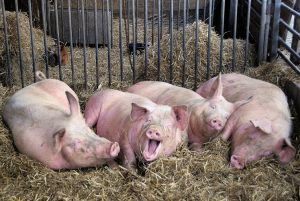Translating Animal Husbandry: Three Challenges
By Sarah-Claire Jordan
 Animal husbandry is the name for the field of caring for and managing livestock. This includes breeding as well as all of the other tasks involved, with the breeding part being selective breeding many times. This selective breeding gives humans the best possible animal for dairy, eggs, meat, wool, and much more. Breeding and management of livestock has been around for thousands of years by now. There are different methods in different countries, but overall the goal now seems to be to produce animals with the best traits in terms of their relationship to humans.
Animal husbandry is the name for the field of caring for and managing livestock. This includes breeding as well as all of the other tasks involved, with the breeding part being selective breeding many times. This selective breeding gives humans the best possible animal for dairy, eggs, meat, wool, and much more. Breeding and management of livestock has been around for thousands of years by now. There are different methods in different countries, but overall the goal now seems to be to produce animals with the best traits in terms of their relationship to humans.
As with anything related to agriculture and the environment, animal husbandry has become a global issue. With this change comes the need to share information across borders, which is where translation comes in. However, this is no easy task for even the most seasoned translator. Here is why:
1. Terminology
Though animal husbandry involves veterinary medicine to some level, it only focuses on those animals which humans use for food, clothing, and other things. Still, there is a lot of overlap, and just as with medical translation, the terminology is the most complex part of the translation process. Veterinary medicine terminology is even more comprehensive and specific, as it encompasses much more than just one species of animal. A translator must have a background in veterinary medicine to be able to properly translate anything about animal husbandry, or else the information won’t be understood correctly.
2. Cultural factors
Just as so many countries have their own terms for animals and their parts, cultural differences need to be taken into account when translating anything related to animal husbandry. For example, any information about how to raise a cow for meat should probably be omitted in any document being translated into a language spoken in India. India is a predominantly Hindu country, and with Hinduism being a religion that holds the cow sacred, this would probably offend many people. The same goes for information on raising pigs for meat in predominantly Muslim countries. It would be a shame if an entire document was discarded because of some offensive parts that could easily be left out without compromising the rest.
3. Geography and climate
Some countries are perfect for raising certain kinds of animals, while others are not hospitable at all for the same species. Though it’s true that we are becoming more and more of a globalized world, with methods of industrialized farming spreading quickly to many different countries, at the root of it all is the environment. If we start to think the same way about animal husbandry for each and every climate and type of land, soon we will be left with a frail and sick planet. Translators need to take into consideration that certain species flourish in certain climates and on certain types of land, and others don’t. Doing a little bit of research before translating would solve any issues concerning whether or not some information is applicable to a country or not.
Alpha Omega Translations is a translation, interpretation, and desktop publishing company dedicated to spreading knowledge globally, especially if it will help make the world a better place.
Category: Business Translation








